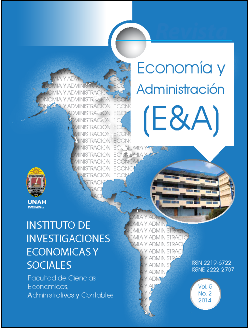Ecological Economics to the Environmental Economics for Reproduction of Nature in Terms of Life
DOI:
https://doi.org/10.5377/eya.v5i2.2185Keywords:
capital, ecology, nature, efficiency, competitivenessAbstract
The problem of natural resource exploitation and distribution and the implications it brings, is a complex problem, its causes are diverse and their solution apart from being a technical difficulty, is also political decision. Private growth is conceived as an end in itself and politics whose center and end the life of the human being underestimated.
The ecological imbalance is the result of human action, the product of anti-ecological consciousness that favors having over being, promoting consumer lifestyle, which leads man to produce and consume, where the highest values are the laws of market, whose demands are detrimental to nature and the resources it provides .
The logic of growth that has supported the production model is the one that obeys the maximization of profits with cost reduction, leading to exploit the land and its resources without saving rationality at the expense of ecological balance and the same human being to be the subject and purpose of economic activity.
Economía y Administración (E&A) Vol.5(2) 2014: 91-104
Downloads
1255
Downloads
Published
How to Cite
Issue
Section
License
Los autores que publican en esta revista están de acuerdo con los siguientes términos:
- Los autores conservan los derechos de autor y garantizan a la revista el derecho de ser la primera publicación del trabajo al igual que licenciado bajo una Creative Commons Attribution License que permite a otros compartir el trabajo con un reconocimiento de la autoría del trabajo y la publicación inicial en esta revista.
- Los autores pueden establecer por separado acuerdos adicionales para la distribución no exclusiva de la versión de la obra publicada en la revista (por ejemplo, situarlo en un repositorio institucional o publicarlo en un libro), con un reconocimiento de su publicación inicial en esta revista.
- Se permite y se anima a los autores a difundir sus trabajos electrónicamente (por ejemplo, en repositorios institucionales o en su propio sitio web) antes y durante el proceso de envío, ya que puede dar lugar a intercambios productivos, así como a una citación más temprana y mayor de los trabajos publicados (Véase The Effect of Open Access) (en inglés).




